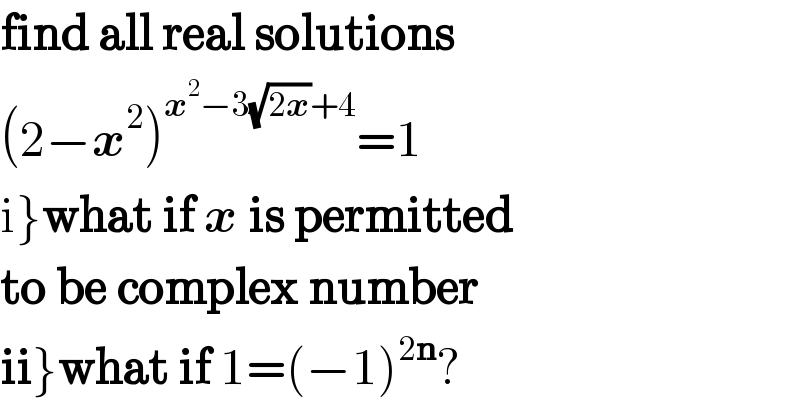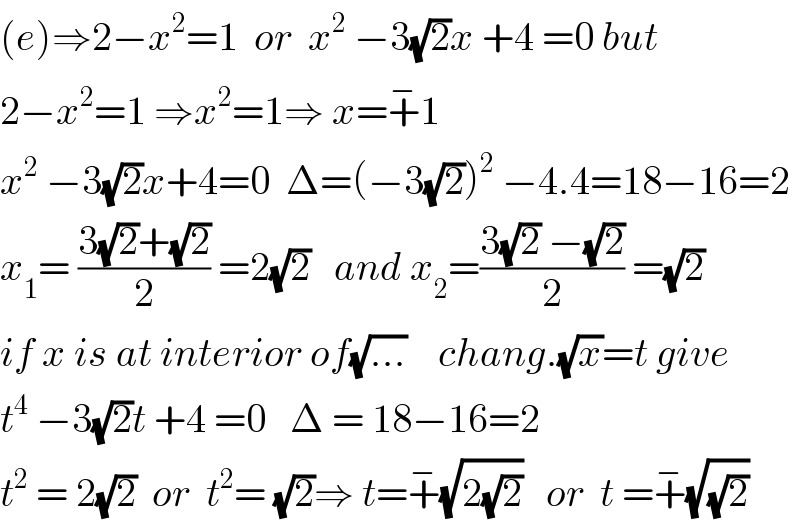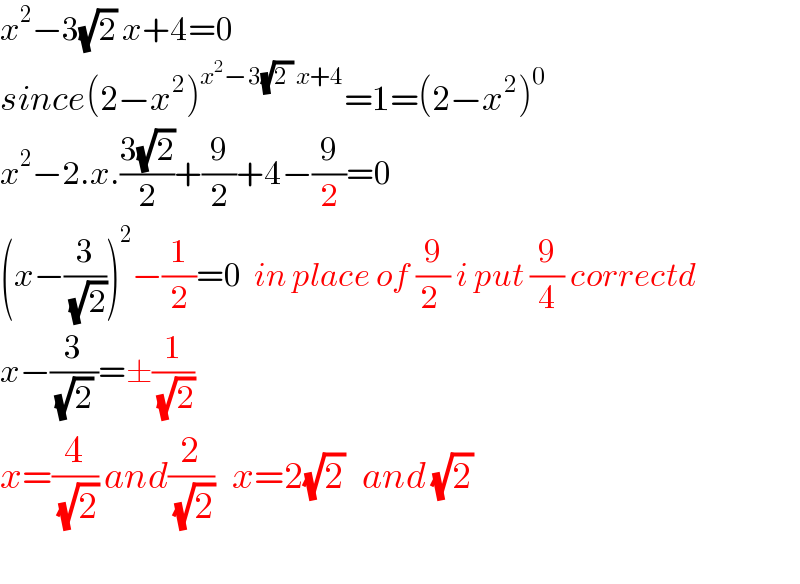
Question Number 37382 by mondodotto@gmail.com last updated on 12/Jun/18

$$\boldsymbol{\mathrm{find}}\:\boldsymbol{\mathrm{all}}\:\boldsymbol{\mathrm{real}}\:\boldsymbol{\mathrm{solutions}} \\ $$$$\left(\mathrm{2}−\boldsymbol{{x}}^{\mathrm{2}} \right)^{\boldsymbol{{x}}^{\mathrm{2}} −\mathrm{3}\sqrt{\mathrm{2}\boldsymbol{{x}}}+\mathrm{4}} =\mathrm{1} \\ $$$$\left.\mathrm{i}\right\}\boldsymbol{\mathrm{what}}\:\boldsymbol{\mathrm{if}}\:\boldsymbol{{x}}\:\boldsymbol{\mathrm{is}}\:\boldsymbol{\mathrm{permitted}} \\ $$$$\boldsymbol{\mathrm{to}}\:\boldsymbol{\mathrm{be}}\:\boldsymbol{\mathrm{complex}}\:\boldsymbol{\mathrm{number}} \\ $$$$\left.\boldsymbol{\mathrm{ii}}\right\}\boldsymbol{\mathrm{what}}\:\boldsymbol{\mathrm{if}}\:\mathrm{1}=\left(−\mathrm{1}\right)^{\mathrm{2}\boldsymbol{\mathrm{n}}} ? \\ $$
Commented by math khazana by abdo last updated on 12/Jun/18

$$\left({e}\right)\Rightarrow\mathrm{2}−{x}^{\mathrm{2}} =\mathrm{1}\:\:{or}\:\:{x}^{\mathrm{2}} \:−\mathrm{3}\sqrt{\mathrm{2}}{x}\:+\mathrm{4}\:=\mathrm{0}\:{but} \\ $$$$\mathrm{2}−{x}^{\mathrm{2}} =\mathrm{1}\:\Rightarrow{x}^{\mathrm{2}} =\mathrm{1}\Rightarrow\:{x}=\overset{−} {+}\mathrm{1} \\ $$$${x}^{\mathrm{2}} \:−\mathrm{3}\sqrt{\mathrm{2}}{x}+\mathrm{4}=\mathrm{0}\:\:\Delta=\left(−\mathrm{3}\sqrt{\mathrm{2}}\right)^{\mathrm{2}} \:−\mathrm{4}.\mathrm{4}=\mathrm{18}−\mathrm{16}=\mathrm{2} \\ $$$${x}_{\mathrm{1}} =\:\frac{\mathrm{3}\sqrt{\mathrm{2}}+\sqrt{\mathrm{2}}}{\mathrm{2}}\:=\mathrm{2}\sqrt{\mathrm{2}}\:\:\:{and}\:{x}_{\mathrm{2}} =\frac{\mathrm{3}\sqrt{\mathrm{2}}\:−\sqrt{\mathrm{2}}}{\mathrm{2}}\:=\sqrt{\mathrm{2}} \\ $$$${if}\:{x}\:{is}\:{at}\:{interior}\:{of}\sqrt{...}\:\:\:\:{chang}.\sqrt{{x}}={t}\:{give} \\ $$$${t}^{\mathrm{4}} \:−\mathrm{3}\sqrt{\mathrm{2}}{t}\:+\mathrm{4}\:=\mathrm{0}\:\:\:\Delta\:=\:\mathrm{18}−\mathrm{16}=\mathrm{2} \\ $$$${t}^{\mathrm{2}} \:=\:\mathrm{2}\sqrt{\mathrm{2}}\:\:{or}\:\:{t}^{\mathrm{2}} =\:\sqrt{\mathrm{2}}\Rightarrow\:{t}=\overset{−} {+}\sqrt{\mathrm{2}\sqrt{\mathrm{2}}}\:\:\:{or}\:\:{t}\:=\overset{−} {+}\sqrt{\sqrt{\mathrm{2}}} \\ $$
Commented by MJS last updated on 13/Jun/18

$$\mathrm{it}'\mathrm{s}\:\mathrm{not}\:{t}^{\mathrm{4}} −\mathrm{3}\sqrt{\mathrm{2}}{t}^{\mathrm{2}} +\mathrm{4}=\mathrm{0}\:\mathrm{but}\:{t}^{\mathrm{4}} −\mathrm{3}\sqrt{\mathrm{2}}{t}+\mathrm{4}=\mathrm{0} \\ $$$$\mathrm{and}\:\mathrm{it}'\mathrm{s}\:\mathrm{not}\:\mathrm{this}\:\mathrm{easy}\:\mathrm{to}\:\mathrm{solve}\:\mathrm{it}\:\left(\mathrm{not}\:\mathrm{sure}\:\mathrm{if}\right. \\ $$$$\left.\mathrm{it}'\mathrm{s}\:\mathrm{possible}\:\mathrm{to}\:\mathrm{find}\:\mathrm{exact}\:\mathrm{solutions}\right) \\ $$
Commented by math khazana by abdo last updated on 13/Jun/18

$${no}\:{sir}\:{Mjs}\:{the}\:{equation}\:{is}\:{x}^{\mathrm{2}} \:−\mathrm{3}\sqrt{\mathrm{2}{x}}\:+\mathrm{4}=\mathrm{0} \\ $$$${so}\:{if}\:{we}\:{set}\:{x}={t}^{\mathrm{2}} \:{we}\:{get}\:{t}^{\mathrm{4}} \:−\mathrm{3}\sqrt{\mathrm{2}}{t}\:+\mathrm{4}=\mathrm{0}\: \\ $$$${there}\:{is}\:{no}\:{error}\:{sir}\left({i}\:{have}\:{considered}\:{x}\:{at}\right. \\ $$$$\left.{the}\:{interior}\:{of}\:\sqrt{...}\right) \\ $$
Answered by tanmay.chaudhury50@gmail.com last updated on 12/Jun/18

$${x}^{\mathrm{2}} −\mathrm{3}\sqrt{\mathrm{2}}\:{x}+\mathrm{4}=\mathrm{0} \\ $$$${since}\left(\mathrm{2}−{x}^{\mathrm{2}} \right)^{{x}^{\mathrm{2}} −\mathrm{3}\sqrt{\mathrm{2}\:}\:{x}+\mathrm{4}} =\mathrm{1}=\left(\mathrm{2}−{x}^{\mathrm{2}} \right)^{\mathrm{0}} \\ $$$${x}^{\mathrm{2}} −\mathrm{2}.{x}.\frac{\mathrm{3}\sqrt{\mathrm{2}}}{\mathrm{2}}+\frac{\mathrm{9}}{\mathrm{2}}+\mathrm{4}−\frac{\mathrm{9}}{\mathrm{2}}=\mathrm{0} \\ $$$$\left({x}−\frac{\mathrm{3}}{\sqrt{\mathrm{2}}}\right)^{\mathrm{2}} −\frac{\mathrm{1}}{\mathrm{2}}=\mathrm{0}\:\:{in}\:{place}\:{of}\:\frac{\mathrm{9}}{\mathrm{2}\:}\:{i}\:{put}\:\frac{\mathrm{9}}{\mathrm{4}}\:{correctd} \\ $$$${x}−\frac{\mathrm{3}}{\sqrt{\mathrm{2}}\:}=\pm\frac{\mathrm{1}}{\sqrt{\mathrm{2}}} \\ $$$${x}=\frac{\mathrm{4}}{\sqrt{\mathrm{2}}}\:{and}\frac{\mathrm{2}}{\sqrt{\mathrm{2}}}\:\:\:{x}=\mathrm{2}\sqrt{\mathrm{2}}\:\:\:{and}\:\sqrt{\mathrm{2}} \\ $$$$ \\ $$
Commented by mondodotto@gmail.com last updated on 12/Jun/18

$$\boldsymbol{\mathrm{does}}\:\boldsymbol{\mathrm{this}}\:\boldsymbol{\mathrm{satisfy}}\:\boldsymbol{\mathrm{the}}\:\boldsymbol{\mathrm{whole}}\:\boldsymbol{\mathrm{equation}}??\:\boldsymbol{\mathrm{remember}} \\ $$$$\boldsymbol{\mathrm{the}}\:\boldsymbol{\mathrm{first}}\:\boldsymbol{\mathrm{part}}\:\boldsymbol{\mathrm{we}}\:\boldsymbol{\mathrm{only}}\:\boldsymbol{\mathrm{need}}\:\boldsymbol{\mathrm{real}}\:\boldsymbol{\mathrm{number}} \\ $$
Commented by tanmay.chaudhury50@gmail.com last updated on 12/Jun/18

$$\mathrm{2}−{x}^{\mathrm{2}} =\mathrm{1} \\ $$$${x}^{\mathrm{2}} =\mathrm{1} \\ $$$${x}=\pm\mathrm{1} \\ $$$${i}\:{thought}\:{this}\:{portion}\:{is}\:{welunderstood} \\ $$
Commented by MJS last updated on 12/Jun/18

$$\mathrm{solutions}\:\mathrm{of}\:{x}^{\mathrm{2}} −\mathrm{3}\sqrt{\mathrm{2}}{x}+\mathrm{4}=\mathrm{0}\:\mathrm{are}\:\mathrm{real} \\ $$
Commented by prakash jain last updated on 12/Jun/18

$$\mathrm{question}\:\mathrm{has}\:\sqrt{\mathrm{2}{x}}\:\:\mathrm{not}\:\sqrt{\mathrm{2}}{x} \\ $$
Answered by MJS last updated on 12/Jun/18
![x∈R (x^2 −3(√2)x+4)ln(2−x^2 )=0 x^2 −3(√2)x+4=0 x=((3(√2))/2)±(√((((3(√2))/2))^2 −4))=((3(√2))/2)±((√2)/2) x_1 =(√2) [this leads to 0^0 which is not defined but I think lim_(x→(√2)) (2−x^2 )^(x^2 −3(√2)x+4) =1 so we can count it] x_2 =2(√2) 2−x^2 =1 x^2 =1 x_3 =−1 x_4 =1](Q37396.png)
$${x}\in\mathbb{R} \\ $$$$\left({x}^{\mathrm{2}} −\mathrm{3}\sqrt{\mathrm{2}}{x}+\mathrm{4}\right)\mathrm{ln}\left(\mathrm{2}−{x}^{\mathrm{2}} \right)=\mathrm{0} \\ $$$${x}^{\mathrm{2}} −\mathrm{3}\sqrt{\mathrm{2}}{x}+\mathrm{4}=\mathrm{0} \\ $$$${x}=\frac{\mathrm{3}\sqrt{\mathrm{2}}}{\mathrm{2}}\pm\sqrt{\left(\frac{\mathrm{3}\sqrt{\mathrm{2}}}{\mathrm{2}}\right)^{\mathrm{2}} −\mathrm{4}}=\frac{\mathrm{3}\sqrt{\mathrm{2}}}{\mathrm{2}}\pm\frac{\sqrt{\mathrm{2}}}{\mathrm{2}} \\ $$$${x}_{\mathrm{1}} =\sqrt{\mathrm{2}} \\ $$$$\:\:\:\:\:\left[\mathrm{this}\:\mathrm{leads}\:\mathrm{to}\:\mathrm{0}^{\mathrm{0}} \:\mathrm{which}\:\mathrm{is}\:\mathrm{not}\:\mathrm{defined}\:\mathrm{but}\right. \\ $$$$\:\:\:\:\:\:\mathrm{I}\:\mathrm{think}\:\underset{{x}\rightarrow\sqrt{\mathrm{2}}} {\mathrm{lim}}\left(\mathrm{2}−{x}^{\mathrm{2}} \right)^{{x}^{\mathrm{2}} −\mathrm{3}\sqrt{\mathrm{2}}{x}+\mathrm{4}} =\mathrm{1}\:\mathrm{so}\:\mathrm{we}\:\mathrm{can} \\ $$$$\left.\:\:\:\:\:\:\mathrm{count}\:\mathrm{it}\right] \\ $$$${x}_{\mathrm{2}} =\mathrm{2}\sqrt{\mathrm{2}} \\ $$$$\mathrm{2}−{x}^{\mathrm{2}} =\mathrm{1} \\ $$$${x}^{\mathrm{2}} =\mathrm{1} \\ $$$${x}_{\mathrm{3}} =−\mathrm{1} \\ $$$${x}_{\mathrm{4}} =\mathrm{1} \\ $$
